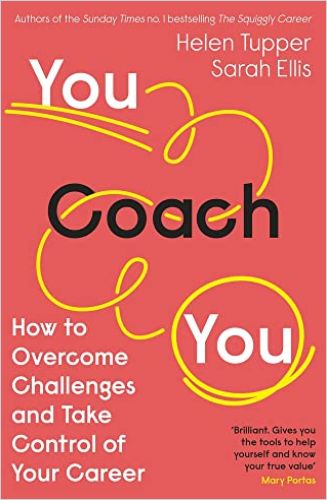Helen Tupper and Sarah Ellis – who co-wrote the best-selling book The Squiggly Career – offer sound, workable advice for boosting your growth mindset and self-belief.

Vest in Self-Belief
Founders of the coaching company Amazing If, Helen Tupper and Sarah Ellis – who co-wrote the best-selling book The Squiggly Career and co-host the Squiggly Careers podcast – combine inspirational prose with a self-coaching and positive-psychology toolkit to help you transform self-limiting beliefs into trust in your limitless potential.
Coach Yourself
Nearly everyone benefits from career coaching, but these services tend to be cost-prohibitive in the United States. Fortunately, you can develop the skills and mindset needed to act as your own career coach, Tupper and Ellis argue.
Learning to coach yourself is not something you tick off your to-do list. It’s a skill you practice, and, like any skill, the more you practice, the better you get.Helen Tupper, Sarah Ellis
Start by increasing your self-awareness. Work on developing a growth mindset – the belief in your ability to learn and change. Recognize and celebrate your moments of growth, and never fixate on barriers or limitations.
Boost your growth mindset by recalling times when you experienced growth and competence. Tupper and Ellis suggest asking yourself questions such as, “When have I felt in control at work?” and “When have I felt confident in my job?”
Your inner critic will try to undermine your efforts. Notice and acknowledge that critical inner voice and practice self-compassion. Speak to yourself as you’d speak to a good friend. If you find yourself discouraged by problems, remember that you simply haven’t found the solutions yet.
Shift Your Mindset
Stop thinking of resilience as bouncing back after setbacks, Tupper and Ellis write. Your experiences change you, and there’s no undoing the past. Keep your eye on the future. Realistically assess your current level of resilience by your degree of optimism when you experience unplanned events, your comfort with requesting help, the frequency with which you celebrate wins, your confidence in the social support structures around you, whether you give yourself adequate time to rest and recover, and the amount of time you spend cultivating interests and enjoying activities outside of work.
An important part of developing resilience is having the confidence to know it’s OK to not be OK and to be able to ask for the help that we need.Helen Tupper, Sarah Ellis
Reframe negative thought patterns, which trap you in self-limiting mindsets. Take action steps, such as seeking out role models of resilience. List the simple pleasures you can enjoy outside of work and carve out time for them.
To take control of your time, Tupper and Ellis recommend thinking more closely about your choices. Notice the percentage of your workday you spend on different tasks. Identify action steps you need to take to improve your use of your time.
To enhance your flow, choose clear goals for each work session, take on tasks that challenge you but remain within your range of capabilities, and stop for short breaks when your brain feels exhausted. Stay mindful of how often you say yes to favors if they take you away from your priorities.
Examine your work-life fit. Reflect on what’s most important at your current stage of life and whether the ways you show up at work and in your personal life reflect your priorities.
Self-Doubt
According to Tupper and Ellis, moments of self-doubt and the accompanying negative emotions serve as data to help you understand what matters most to you. They recommend cultivating emotional agility: the ability to respond to negative emotions in a way that builds self-belief. Assess your level of self-belief by noticing whether you worry about other people’s opinions more than your own views, whether you make statements beginning with “I can” more than “I can’t,” and whether you receive compliments and praise without dismissing them as inaccurate or empty.
Everyone experiences self-doubt, and it can lead to a sense of not being ‘enough’ in some way at work. Helen Tupper, Sarah Ellis
Change your self-limiting beliefs to build trust in your limitless potential. People with high levels of self-belief have the confidence to say no and the courage to challenge the status quo. Sometimes, small shifts in your inner monologue can help you build more positive self-beliefs. For example, when you’re struggling, try speaking words of encouragement to yourself. Say them as if talking to someone else – use your name and the word “you.” If there are beneficial actions you should be taking, but you lack the self-belief to act, envision yourself moving out of your comfort zone and into your “courage zone.” Taking small, courageous actions daily can help you overcome your fears.
Relationships
Quality relationships have a positive effect on your level of career fulfillment. Create a “career community” of five people you can contact during a crisis, ask for advice or invite to celebrate your wins. Include 15 people who provide you with counsel and guide you toward opportunities, such as mentors and present or past managers. Identify 50 valued connections whose input, advice or support benefits you.
Seek out people with different life experiences and backgrounds than your own, who can provide you with new perspectives and fresh ideas. Share your skills and expertise, and strengthen your connections with “weak ties” – people you don’t know well but who may bring you new insights and knowledge.
Tupper and Ellis suggest identifying why certain goals and priorities feel important. You might not be able to move into your dream career role in the present moment, but you can put ideas into action that will bring you closer to what you want.
Connect your work to a sense of purpose to experience eudaimonic happiness, which arises from meaningful experiences.
Finding purpose in our work increases the long-term sense of satisfaction we feel in our lives and improves how engaged and effective we are in our jobs today.Helen Tupper, Sarah Ellis
Reflect on why you wake up and go to work and what you feel happiest about when you go to bed. Your purpose will always be a work in progress: You won’t embody it 100% of the time, and it will always be subject to change.
Review
Helen Tupper and Sarah Ellis have an easy, flowing way with language, and their good-heartedness and positive intentions shine through every sentence. The authors break no new ground; their tips for building self-regard appear in more scattered forms in other books. But you’ll enjoy having all those suggestions in one place, and their advice – though basic – remains sound and practical. Tupper and Ellis know how to encourage without ever sounding glib or insincere, and readers will appreciate their warm tone.






